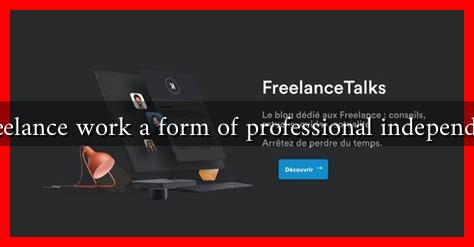-
Table of Contents
Is Freelance Work a Form of Professional Independence?
In recent years, the landscape of work has undergone a significant transformation, with freelance work emerging as a popular alternative to traditional employment. This shift raises an important question: Is freelance work a true form of professional independence? In this article, we will explore the nuances of freelance work, its benefits and challenges, and how it contributes to professional autonomy.
The Rise of Freelance Work
Freelancing has gained traction due to various factors, including technological advancements, changing workforce dynamics, and a desire for flexibility. According to a report by Upwork, as of 2021, 36% of the U.S. workforce was freelancing, a number that has been steadily increasing over the past decade. This trend reflects a growing preference for self-employment and the gig economy.
Defining Professional Independence
Professional independence can be defined as the ability to make choices about one’s work without being constrained by traditional employment structures. This includes:
- Choosing clients and projects
- Setting one’s own rates
- Determining work hours and location
- Having control over the work process and outcomes
Freelancers often enjoy these freedoms, which can lead to a more fulfilling work experience. However, the reality of freelance work is more complex than it may seem.
Benefits of Freelance Work
Freelancing offers several advantages that contribute to a sense of professional independence:
- Flexibility: Freelancers can choose when and where they work, allowing for a better work-life balance.
- Diverse Opportunities: Freelancers can work on a variety of projects across different industries, enhancing their skills and experience.
- Potential for Higher Earnings: Many freelancers can earn more than they would in traditional jobs, especially in high-demand fields.
- Autonomy: Freelancers have the freedom to make decisions about their work without the constraints of a corporate hierarchy.
Challenges of Freelance Work
Despite its benefits, freelance work also comes with challenges that can impact professional independence:
- Income Instability: Freelancers often face fluctuating income, making financial planning difficult.
- Isolation: Working independently can lead to feelings of loneliness and disconnection from peers.
- Self-Management: Freelancers must manage their own business operations, including marketing, accounting, and client relations.
- Lack of Benefits: Unlike traditional employees, freelancers typically do not receive health insurance, retirement plans, or paid time off.
Case Studies: Freelancers in Action
To illustrate the concept of professional independence in freelancing, consider the following examples:
- Graphic Designer: A freelance graphic designer can choose projects that align with their interests, set their own rates, and work from anywhere. This autonomy allows them to create a portfolio that reflects their unique style.
- Software Developer: A freelance software developer may work with multiple clients simultaneously, allowing them to diversify their income streams and gain experience in various technologies.
These examples highlight how freelancers can leverage their skills to achieve professional independence while navigating the challenges that come with it.
Conclusion: The Dual Nature of Freelance Work
In conclusion, freelance work can indeed be seen as a form of professional independence, offering flexibility, autonomy, and diverse opportunities. However, it is essential to recognize the challenges that accompany this lifestyle, such as income instability and the need for self-management. Ultimately, the degree of independence a freelancer experiences depends on their ability to navigate these challenges while capitalizing on the benefits of freelancing.
As the workforce continues to evolve, understanding the dynamics of freelance work will be crucial for both individuals seeking autonomy and organizations looking to adapt to this changing landscape. For more insights on freelancing and the gig economy, you can visit Upwork.

